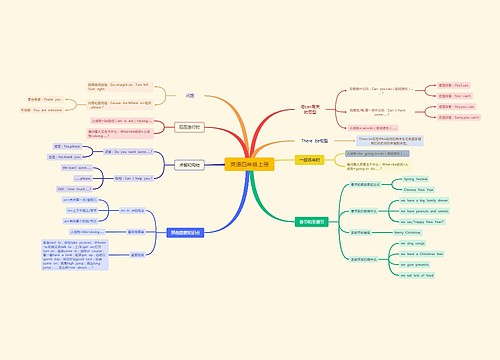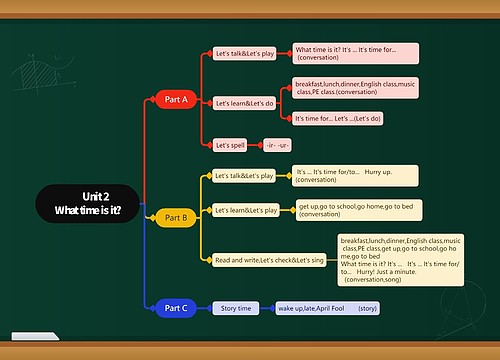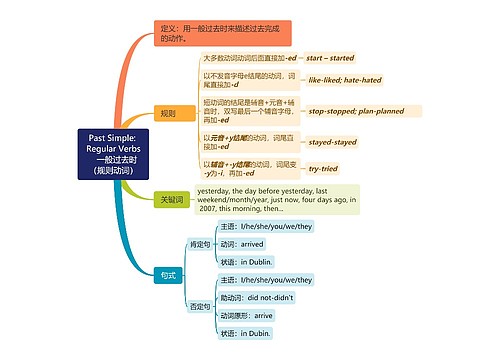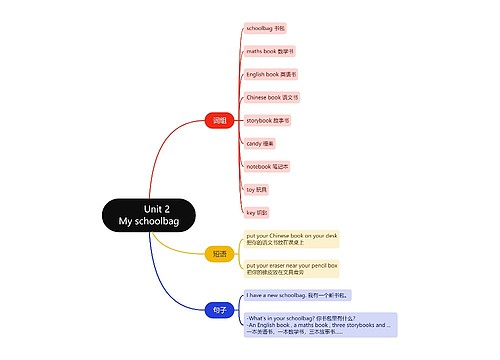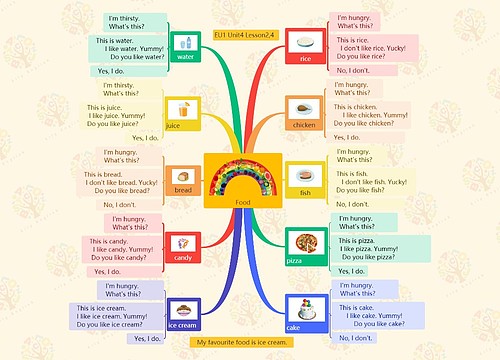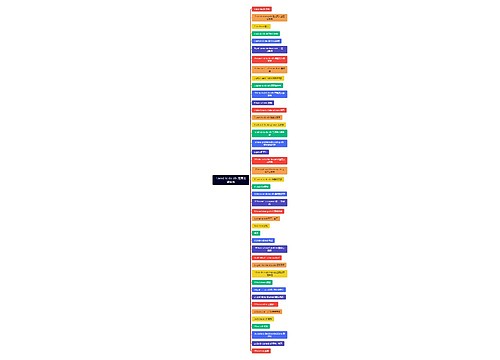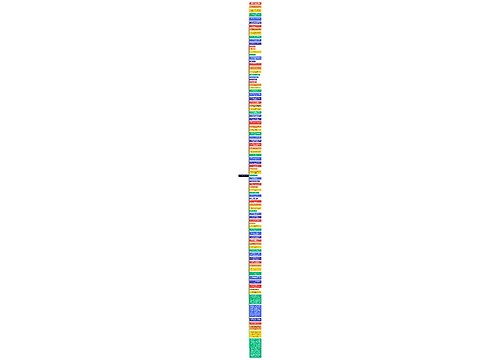
Unit 1 What’s the matter?思维导图
U668519106
2024-06-05

反身代词
对身体有益
常用短语有
小学四年级英语词汇语法介绍
树图思维导图提供《Unit 1 What’s the matter?》在线思维导图免费制作,点击“编辑”按钮,可对《Unit 1 What’s the matter?》进行在线思维导图编辑,本思维导图属于思维导图模板主题,文件编号是:11099cdeacaa252b8b1ee78e0b137462
思维导图大纲
相关思维导图模版
Unit 1 What’s the matter?思维导图模板大纲
词句精讲精练
词汇精讲
1. have a cold
have a cold是动词短语,意为“患感冒,伤风”,也可以说成catch a cold/get a cold或take a cold。其中have表示“患病,得病”,不能用于进行时态,但可与一段时间连用,表示状态;而catch/get a cold则表示瞬时动作,不能同一段时间连用。例如:
I have had a cold for three days\. 我感冒三天了。
此句也可以表达为:
I had/caught/got a cold three days ago\.
【拓展】
表示人体某部位“痛”时的几种结构:
(1)have a + 身体部位名词后加-ache构成。例如:
have a headache 头痛
have a toothache 牙痛
have a stomachache胃痛
(2)have a sore + 身体部位名词。例如:
have a sore throat 喉咙痛
have a sore arm 胳膊痛
have a sore foot 脚痛
(3)身体部位 + hurt/ache。例如:
My eyes hurt. 我眼睛痛。
My legs ache. 我腿疼。
(4)have a pain in/ on + the + 身体部位。例如:
I have a pain in the arm. 我胳膊痛。
(5)There is something wrong with + one’s + 身体部位。例如:
There is something wrong with your eyes\. 你的眼睛有毛病。
2. rest
(1)rest作及物动词,意为“使休息”,作不及物动词,意为“休息”。例如:
You should rest your eyes after a lot of reading.
在大量阅读之后,你应该休息一下你的眼睛。
I’m tired, and I want to rest. 我累了,我想休息。
(2)rest也可以作名词,常用搭配have a rest,表示“休息一下”。例如:
You have a cold,and should have a rest.
你感冒了,应该休息一下。
3. break
(1)break作不及物,意为“弄碎,破碎”。break的过去式为broke,过去分词为broken。例如:Glass is easily broken. 玻璃容易破碎。
(2)break作及物动词,意为“弄碎,弄断”。例如:
Li Ming broke his left leg last night. 昨晚李明摔断了左腿。
(3)break作及物动词,意为“不遵守”。例如:
As a student, you shouldn’t break school rules.
作为学生,你不该违反学校规则。
【拓展】
(1) break down 意为“(机器)坏了”。例如:
We are sorry to arrive late, because the car broke down.
我们很抱歉到晚了,因为车抛锚了。
(2)break into 表示“破门而入”。例如:
I caught two men trying to break into the office. 我瞧见两个人想闯入我的办公室。
(3)break out 表示“(战争、瘟疫、火灾等)爆发”。例如:
World War II broke out in September 1939. 第二次世界大战爆发于1939年9月。
4. hurt
(1)hurt作及物动词,意为“使受伤,使弄痛”,过去分词和过去式都是hurt。例如:
He hurt his right knee. 他伤了右膝。
I hope you haven’t hurt yourself. 但愿你没有受伤。
(2) hurt 既可指肉体上的伤害,也可指精神上、感情上的伤害。例如:
You hurt her feelings when you said she was fat.
你说她胖,伤害了她的感情了。
I don’t mean to hurt you. 我并非有意伤害你。
(3)hurt作不及物动词,意为“疼痛”。例如:
My feet hurt when I walk. 我走路时脚疼。
I caught a cold and my head hurt. 我感冒了而且头痛。
5. free
free作及物动词,意为“使自由”。例如:
Can you free me for half an hour? 你能让我自由一个小时吗?
【拓展】
(1)free作形容词,表示“自由的;空闲的”。例如:
You are free to ask questions. 你可以请随便问。
Are you free tomorrow?你有空吗?
(2)free还可作“免费的”。例如:
Are the drinks free? 这饮料是免费的吗?
The books are given away free. 这些书是免费赠送的。
(3)free的副词freely可表示“自由地,随便地等”,可位于动词之前或之后。例如:
You may speak freely. 你可以直言。
He could write freely about it now. 他可以自由地写这个事了。
6. mean
(1)mean作及物动词,表示“打算,意味着”,后接名词,动词不定式短语或从句。例如:
The red light means “Stop”. 红灯表示停止。
I mean to go shopping. 我的意思是去购物。
The sign means that the road is blocked. 这个标志表示此路不通。
(2)mean的名词形式是“meaning”,表示“意思、含义”。例如:
What’s the meaning of the word? 这个单词的是什么意思?
(3)What do / did you mean by...? 该句型的意思是“你……是什么意思?” 例如:
What do you mean by acting like this? 你这样做是什么意思?
7. lie
lie是动词,意为“躺”,过去式和过去分词分别为lay和lain,现在分词为lying。例如:
I found he was lying on the ground. 我发现他躺在地上。
【拓展】
(1) lie有“位于”的意思。例如:
A temple lies on the top of the mountain\. 一座寺庙位于山顶之上。
(2) lie作动词时,也可意为“撒谎”,过去式和过去分词是规则的,均为lied。lie也可用作名词,意为“谎言”。例如:
Don’t lie to me\.不要向我撒谎。
The boy told a lie to me\. 这个男孩向我撒了谎。
原形
词义
过去式
过去分词
现在分词
lie
躺;位于
lay
lain
lying
lie
说谎
lied
lied
lying
(3)英语中,部分以-ie结尾的动词的-ing形式必须改ie为y再加-ing。例如:
die → dying tie → tying lie → lying
8. breathe
breathe可以作不及物动词也可以作及物动词,意为“呼吸”。例如:
The old man is breathing hard.这位老人呼吸困难。
It’s good to breathe fresh air. 呼吸新鲜空气有好处。
【拓展】
辨析breathe和breath
这两个词都是表示“呼吸”的意思,但词性不同。breath 是名词;breathe 是动词。例如:
He has run himself out of breath.
他跑得上气不接下气。
It’s healthy to breathe deeply in the morning
早上做深呼吸对身体有益。
breath的常用短语: take a deep breath 深呼吸;out of breath上气不接下气
9. ourselves
ourselves是反身代词,意为“我们自己”。表示“某人自己”的代词,叫反身代词,也叫自身代词。反身代词在句子中可以作宾语、表语和同位语,需要注意反身代词与所指代的名词或代词在人称、性别和数上保持一致。
反身代词的构成是:
第一人称和第二人称是“形容词性物主代词+-self/selves”。例如:myself(我自己),ourselves(我们自己),yourself(你自己),yourselves(你们自己)
第三人称是“宾格代词+-self/selves”;单数形式是加-self,复数形式是加-selves。例如:himself(他自己),herself(她自己),itself(它自己),themselves(他们自己)
注意:
于
常用短语有:
by oneself 某人独自 enjoy oneself=have a good time 玩得开心
teach oneself 自学 help oneself to… 随便吃、喝……
dress oneself 自己穿衣服 hurt oneself 伤了自己
词汇精练
I. 英汉词组互译。
1. have a cold _________ 2. 量体温_________
3. to one’s surprise_________ 4. 同意做某事_________
5. be used to doing sth... ________ 6. 看医生________
7. run out of_______ 8. 下车________
9. thanks to ________ 10. 及时________
II. 根据汉语或首字母提示补全句子。
1. Do you______ (介意) if I open the window?
2.Be careful,not to _______(受伤) yourself.
3.Tom is in a difficult s_______.
4.I have made a d_______ about my study goal for the new term.
5.We should look after o_______ when we are alone at home.
6.If you have a fever,you s_______ lie down and rest.
7.I have a _______(牙疼),so I want to see a dentist(牙医).
8.They retire(退休) and have a lot of f_______ time.
III. 从括号中所给单词的适当形式填空。
1.It’s hard to make a _______(decide) now.
2.Is she used to _______(walk) after supper?
3.The _______(die) of her lovely cat makes her sad.
4.As time goes by,we can realize the _______(important) of love.
5._______ he _______(have) a sore back?
6.He should _______(have) some hot water.
7.Look! A dog _______(lie) at the door.
8.We are _______(surprise) at the news.
9.He kept on _______(work) though his leg hurt.
10.No one can be successful _______(with) hard work.
句式精讲
1. What’s the matter?
What’s the matter?和What’s wrong?是用来询问对方出了什么毛病或问题,意为“怎么了?”,是医生询问病人病情时的常用语。例如:
— What’s the matter? 你怎么了?
—I have a stomachache. 我胃疼。
—What’s wrong, Tom? Tom怎么了?
—I don’t feel very well. 我感觉不太舒服。
【拓展】
What’s the matter?和What’s wrong?后可接with sb\. / sth\.,即What’s the matter with sb\./ sth\.?或What’s wrong with sb\./sth\.?意为“某人/某物怎么了?”例如:
What’s the matter with you? = What’s wrong with you? 你怎么了?
—What’s wrong / What’s the matter with your leg? 你的腿怎么了?
—Nothing. 没什么。
注意:
a
不能说What’s your wrong? 和What’s your matter?
2. —What should she do?
—She should take her temperature.
should作情态动词,意为“应当,应该”。表示义务、责任,可用于各种人称,无人称和数的变化,也不能单独作谓语,只能和主要动词一起构成谓语,表示说话人的语气和情态;否定形式为should not,缩写为shouldn’t。其主要用法有:
(1) 表示责任和义务,意为“应该”。例如:
You should take your teacher’s advice\. 你应该听从你老师的建议。
You shouldn’t be late for class\. 你不应该上课迟到。
(2) 表示推断,意为“可能,该”。例如:
The train should have already left\. 火车可能已经离开了。
3. But to his surprise,they all agreed to go with him.
(1) surprise作动词时,意为“使……惊奇,使……感到意外、吃惊”。例如:
What surprised you? 什么事使你感到意外?
\(2\) surprise作不可数名词时,表示“惊奇,惊异”。例如:
Her face showed surprise at the news.
听到这个消息,她的脸上露出了惊奇的表情。
(3) surprise作可数名词时,表示“惊奇、惊讶、意外的事或吃惊的事”。例如:
He gave me a surprise by arriving early.
他的早到使我大感意外。
(4)作名词用时常可构成如下短语:
to one’s surprise意为“使某人吃惊的是……”;in surprise意为“吃惊地 ”。例如:
To my surprise, he passed the exam\.
使我吃惊是,他竟然通过了考试。
He looked at me in surprise\. 他吃惊地望着我。
4. He was not ready to die that day.
(1)ready 作形容词,意为“准备好的”。例如:
Are you ready? 你准备好了吗?
(2)be/get ready to + 动词原形,意为“准备做……”。例如:
【拓展】
be ready for意为“准备去……”,后接名词或动名词,同义短语为get ready for。例如:
The chicken will soon be ready for the pot.
这些鸡肉很快就可以准备下锅了。
5. Aron loves mountain climbing and doesn’t mind taking risks.
mind作及物动词,意为“介意、照料、留神、注意”。常用于疑问句、否定句、条件句中,后面接名词、代词、动词-ing形式或从句。例如:
Would you mind opening the window? 你介意打开窗户吗?
Don’t mind me\.不要管我。
【拓展】
mind还可作名词,意为“智力、头脑、想法、意见”。例如:
He has quick mind\. 他头脑敏锐。
Tom changed his mind at last\. 最后Tom改变了主意。
句式精练
I. 按括号中的要求改写句子。
1
W
2
_
3
4
W
5
I
6
_
7
I
8
A
9
H
1
I
II.根据汉语提示完成下列句子。
1. — 你的手表怎么了?
7. 你介意调低音乐吗?
Would you ________ _______ _______the music?
8. 所有学生在为运动会做准备。
All the students ______ ______ ______ ______the sports meeting.
·
查看更多
1113爆卡会总结会会议纪要思维导图
 U245265618
U245265618树图思维导图提供《1113爆卡会总结会会议纪要》在线思维导图免费制作,点击“编辑”按钮,可对《1113爆卡会总结会会议纪要》进行在线思维导图编辑,本思维导图属于思维导图模板主题,文件编号是:aaf6c152a765d5821e8e1787f2b3226e
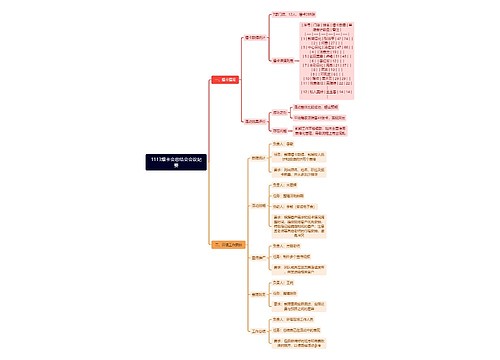
第1章 化工设计基本知识思维导图
 U882667602
U882667602树图思维导图提供《第1章 化工设计基本知识》在线思维导图免费制作,点击“编辑”按钮,可对《第1章 化工设计基本知识》进行在线思维导图编辑,本思维导图属于思维导图模板主题,文件编号是:70ec0519ed26419068a32a511862aadd
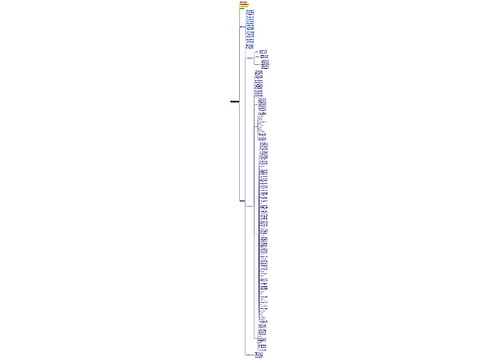
相似思维导图模版
首页
我的文件
我的团队
个人中心
